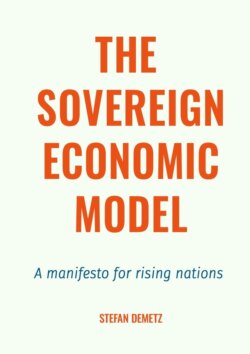Читать книгу The Sovereign Economic Model. A manifesto for rising nations - Stefan Demetz - Страница 11
Politics of the sovereign economic model
Hidden Power Struggles
ОглавлениеEconomic conquest is a game the Big Powers have always practiced through their trading companies, and so it continues today. Money is power; therefore, the control of business and money translates into the political sphere of a country in the following ways.
WTO and trade agreements. The World Trade Organization (WTO) is an international organization that regulates trade between nations. It provides a framework to reconcile trading rules for countries with disparate types and levels of economic activity. While it should be independent and neutral, it is not impartial. It is strongly biased toward wealthier nations and their large transnational organizations. It favors them over developing countries by reducing access to technologies (intellectual property, IP), food, and pharmaceuticals. Since its inception, it has been highly negative for poor countries because it allows richer nations to use non-tariff barriers to block imports from developing nations. Infant industries in developing countries are affected particularly by WTO policies and politics. Similar to the global WTO, other regional trade agreements, especially where major differences exist between participant countries, are similarly tilted toward the wealthiest nations, who impose their rules on smaller, weaker countries.
International division of labor is a concept of globalization. Labor is carried out in the most «convenient» places. Some countries are «assigned» many industries, and others are excluded. It is a sort of modern feudalistic vassalage system not in the interest of a sovereign country, a theory and modus operandi pushed by international companies. They are interested in profitability due to reduced labor costs, taxes, and manufacturing and transport costs.
IMF, World Bank, and other international institutions. International financial institutions like the International Monetary Fund (IMF) and World Bank were created to help smaller, poorer countries bridge the gap to the richer countries. They were intended to finance these countries to increase their economic growth and standard of living. In fact, however, both of these organizations use finance to hinder, block, and destroy competitors of large multinational corporations in developing countries. It is well known that countries from the Eastern European post-Soviet bloc were forced to shutter business and power plants to receive financial help. This has increased the economic and political dependence of these countries on the institutions themselves while lowering their chance to implement locally suitable economic policies with existing market sectors.
Measurements of economic sovereignty. The economic sovereignty of a country is measured using different indicators:
• Political sovereignty to decide economic development model and policies
• Control of strategic sectors and business ecosystems
• Independence of food, energy, and technologies
• Ability to produce most strategically important goods and services
Often, poor countries or those in trouble due to war, natural disasters, or other factors are offered generous financial aid. This ostensible help from outside is always tied to political and economic conditions. Such covenants include adherence to disadvantageous terms often in the form of trade treaties, forced privatizations, forced closure of competitors, market access, political concessions, or military access to the territory.
Economic colonialism for developing and emerging markets. In developing and emerging countries, many people complain of economic colonialism base on money, finance, trade and technology. Stronger and richer countries use financial tools to impose colonialism on smaller and weaker countries, creating resentment. These tools might be any of the following:
• Currency exchange pegging to the US dollar
• Payment systems
• Credit cards
• Financial standards
• Financial education
Many large TNCs have colonized smaller or weaker countries using tools of commercial colonialism. By using their vast array of brands and goods, their financial power, and the political force of their home countries, they have pushed the door down and taken over the markets. The host countries could not impede this colonization due to their lack of economic defenses and their inherently weak economies. It is noticeable in many countries that fast-moving consumer goods (FMCGs) made by companies in only a few countries are available. These goods come mainly from US and UK companies, while companies from other regions, such as Europe, are completely missing from the market.
Some economic commentators have pointed out that the developed nations establish and use technological colonialism as a power lever against smaller countries. To some countries, the developed nations deny the right to buy certain technologies by making excuses or imposing sanctions. They do so to put pressure on the smaller countries or to slow their development or progress.
Use of economic instruments by leading nations is a means of geopolitical primacy. It always has been and always will be.
